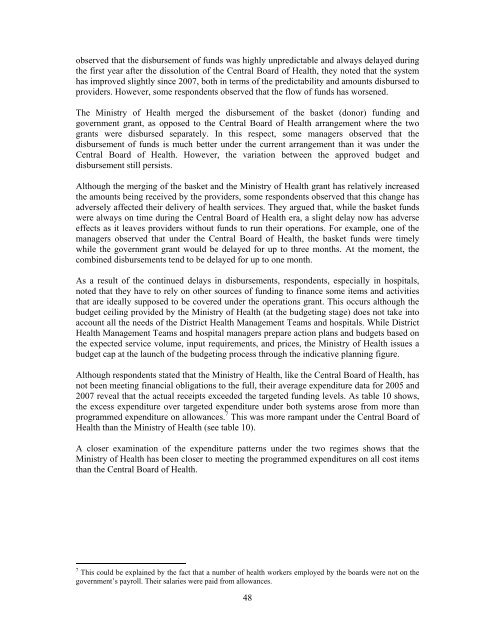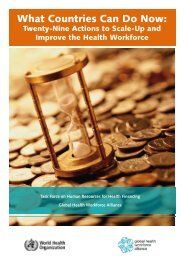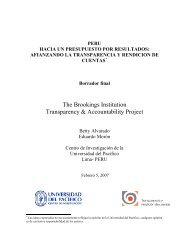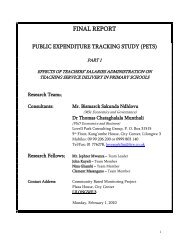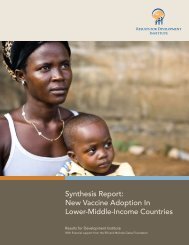Provider Purchasing and Contracting for Health Services_The Case
Provider Purchasing and Contracting for Health Services_The Case
Provider Purchasing and Contracting for Health Services_The Case
Create successful ePaper yourself
Turn your PDF publications into a flip-book with our unique Google optimized e-Paper software.
observed that the disbursement of funds was highly unpredictable <strong>and</strong> always delayed during<br />
the first year after the dissolution of the Central Board of <strong>Health</strong>, they noted that the system<br />
has improved slightly since 2007, both in terms of the predictability <strong>and</strong> amounts disbursed to<br />
providers. However, some respondents observed that the flow of funds has worsened.<br />
<strong>The</strong> Ministry of <strong>Health</strong> merged the disbursement of the basket (donor) funding <strong>and</strong><br />
government grant, as opposed to the Central Board of <strong>Health</strong> arrangement where the two<br />
grants were disbursed separately. In this respect, some managers observed that the<br />
disbursement of funds is much better under the current arrangement than it was under the<br />
Central Board of <strong>Health</strong>. However, the variation between the approved budget <strong>and</strong><br />
disbursement still persists.<br />
Although the merging of the basket <strong>and</strong> the Ministry of <strong>Health</strong> grant has relatively increased<br />
the amounts being received by the providers, some respondents observed that this change has<br />
adversely affected their delivery of health services. <strong>The</strong>y argued that, while the basket funds<br />
were always on time during the Central Board of <strong>Health</strong> era, a slight delay now has adverse<br />
effects as it leaves providers without funds to run their operations. For example, one of the<br />
managers observed that under the Central Board of <strong>Health</strong>, the basket funds were timely<br />
while the government grant would be delayed <strong>for</strong> up to three months. At the moment, the<br />
combined disbursements tend to be delayed <strong>for</strong> up to one month.<br />
As a result of the continued delays in disbursements, respondents, especially in hospitals,<br />
noted that they have to rely on other sources of funding to finance some items <strong>and</strong> activities<br />
that are ideally supposed to be covered under the operations grant. This occurs although the<br />
budget ceiling provided by the Ministry of <strong>Health</strong> (at the budgeting stage) does not take into<br />
account all the needs of the District <strong>Health</strong> Management Teams <strong>and</strong> hospitals. While District<br />
<strong>Health</strong> Management Teams <strong>and</strong> hospital managers prepare action plans <strong>and</strong> budgets based on<br />
the expected service volume, input requirements, <strong>and</strong> prices, the Ministry of <strong>Health</strong> issues a<br />
budget cap at the launch of the budgeting process through the indicative planning figure.<br />
Although respondents stated that the Ministry of <strong>Health</strong>, like the Central Board of <strong>Health</strong>, has<br />
not been meeting financial obligations to the full, their average expenditure data <strong>for</strong> 2005 <strong>and</strong><br />
2007 reveal that the actual receipts exceeded the targeted funding levels. As table 10 shows,<br />
the excess expenditure over targeted expenditure under both systems arose from more than<br />
programmed expenditure on allowances. 7 This was more rampant under the Central Board of<br />
<strong>Health</strong> than the Ministry of <strong>Health</strong> (see table 10).<br />
A closer examination of the expenditure patterns under the two regimes shows that the<br />
Ministry of <strong>Health</strong> has been closer to meeting the programmed expenditures on all cost items<br />
than the Central Board of <strong>Health</strong>.<br />
7 This could be explained by the fact that a number of health workers employed by the boards were not on the<br />
government’s payroll. <strong>The</strong>ir salaries were paid from allowances.<br />
48


